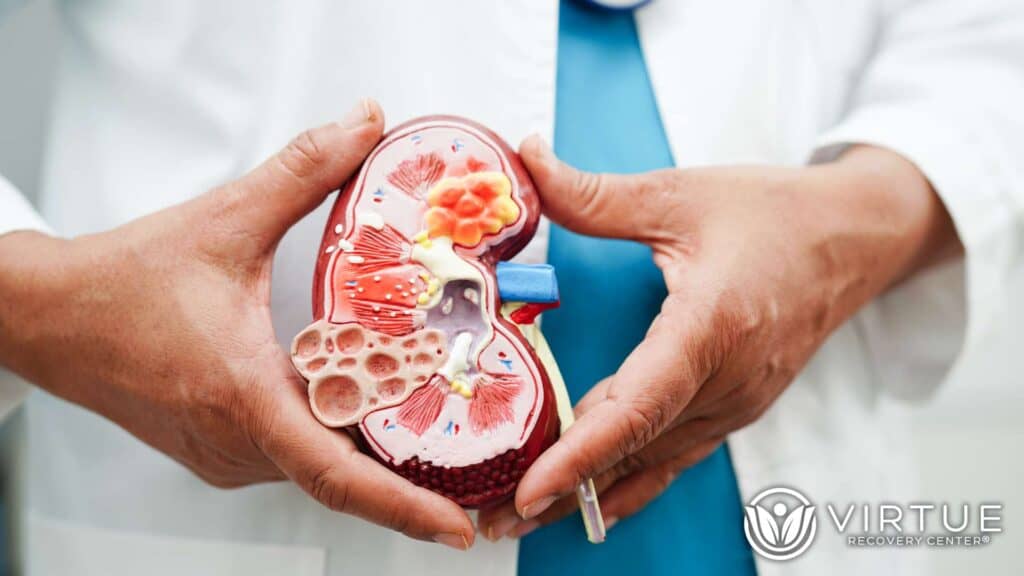Key Takeaways
- Some medications can be harmful to the kidneys, especially with long-term use.
- Both prescription and over-the-counter drugs can cause kidney damage.
- People with pre-existing kidney conditions are at a higher risk of harm from certain medications.
- Protecting your kidney health involves monitoring medications and working with healthcare providers.
Introduction
Our kidneys are essential for filtering waste and keeping our bodies healthy. But did you know that certain medications, including common over-the-counter drugs, can damage your kidneys? Some medications can reduce blood flow to the kidneys, cause inflammation, or even lead to chronic kidney disease. This article will explore the top 10 drugs that may cause kidney damage and how you can protect your kidney health. Understanding how medications affect your kidneys is crucial, whether you have existing kidney problems or want to avoid potential harm.Understanding How Medications Can Cause Kidney Damage
Your kidneys play a key role in keeping your body balanced. They filter waste, control fluid levels, and regulate blood pressure. Certain medications can interfere with kidney function by reducing blood flow or causing inflammation. Over time, this can lead to acute kidney injury or chronic kidney damage. For people with pre-existing kidney disease or other health conditions, taking the wrong medications can increase the risk of kidney problems. Knowing which drugs pose a risk is the first step toward protecting your kidneys.Top 10 Drugs That May Cause Kidney Damage
-
Nonsteroidal Anti-Inflammatory Drugs (NSAIDs)
-
Antibiotics
-
Diuretics
-
Proton Pump Inhibitors (PPIs)
-
Antiviral Medications
-
Chemotherapy Drugs
-
Lithium
-
ACE Inhibitors and ARBs
-
Contrast Dyes
-
Herbal Supplements
Who Is at Risk for Drug-Induced Kidney Damage?
Certain people are more vulnerable to kidney damage from medications, especially those with existing health conditions.- People with pre-existing kidney conditions: Some medications may be riskier for you if you have chronic kidney disease or a history of kidney issues.
- Elderly individuals: Kidney function naturally decreases as we age, making the elderly more susceptible to kidney injury from medications.
- People with diabetes or high blood pressure: These conditions are often linked to kidney problems, so medications taken to manage them may have added risks.
- Patients on multiple medications: Taking several drugs at once increases the chances of drug interactions that could harm the kidneys.
How to Protect Your Kidneys While Taking Medications
There are steps you can take to protect your kidneys while still getting the medications you need:- Talk to Your Doctor: Always consult with your healthcare provider before starting new medications, especially if you have existing kidney problems. Your doctor may adjust the dose or suggest alternative treatments.
- Limit NSAID Use: While NSAIDs are helpful for pain, it’s best to use them sparingly. Ask your doctor about safer alternatives if you need long-term pain relief.
- Stay Hydrated: Drinking plenty of water helps your kidneys filter waste and medications more efficiently. Staying hydrated is especially important if taking medicines that may affect the kidneys.
- Monitor Kidney Function: Regular kidney function tests, like blood and urine tests, can detect early signs of kidney damage. If you’re on medication that could harm your kidneys, make sure your doctor monitors your kidney health.
- Manage Chronic Conditions: Keep conditions like high blood pressure and diabetes under control to reduce stress on your kidneys. Healthy lifestyle choices, such as regular exercise and a balanced diet, can help protect your kidneys from damage.
Conclusion
Medications can improve health and manage chronic conditions, but some can also cause harm to the kidneys if misused. By understanding the risks of certain medications, like NSAIDs, antibiotics, and chemotherapy drugs, you can take steps to protect your kidney health. Always talk to your doctor about how medications may affect your kidneys, and take proactive steps to monitor and safeguard your kidney function. If you or a loved one is concerned about medications that could cause kidney damage, call Virtue Recovery Houston at 713-234-6254 to learn about treatment options and ways to protect your kidney health.Can Crystal Meth Use Increase the Risk of Kidney Damage from Certain Medications?
The use of crystal meth can significantly complicate medication safety. Certain drugs may lead to heightened risks of kidney damage, particularly in individuals with pre-existing health issues. The impact of crystal meth on dna can exacerbate these effects, making awareness and caution essential for those at risk.








